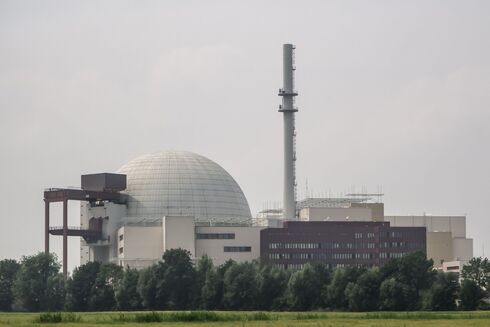
Energy strategy should boost hire activity
7 April 2022

The government has published its long-awaited Energy Security Strategy for a major acceleration of home-grown power and greater energy independence in Britain.
Some might say it’s a decade late given the massive long-term infrastructure implications and the need to develop the innovative technology that will be required. Elements of it could also be a knee-jerk reaction to the energy supply disruption caused by Russia’s invasion of Ukraine.
Nevertheless, the construction effort that will be needed to build the necessary facilities should result in major long-term projects that hirers will supply equipment for.
The Prime Minister believes that 95% of Britain’s electricity could be low-carbon by 2030 through the expansion of nuclear (pictured), wind, solar, hydrogen, oil and gas, including delivering eight new nuclear facilities. Around 25% of projected electricity demand could be met by nuclear sources, including small modular reactors that are still in the development stages.
Other plans include more offshore wind farm development, onshore wind projects amongst “supportive local communities”, and granting more licences for North Sea oil and gas production. As the blog has highlighted, machinery powered by internal combustion engines will be needed for some time yet for heavy-duty tasks.
The strategy also advocates wider adoption of heat pumps and increasing solar capacity by up to five times by 2035, particularly on domestic and commercial rooftops.
Production of low-carbon will also be increased to up to 10GW of capacity by 2030, with at least half coming from green hydrogen and utilising excess offshore wind power to bring down costs, according to the strategy.
There is no mention of fracking – hydraulic fracturing to release shale gas, which was paused in November 2019 after a report found it was not possible to accurately predict the probability or magnitude of earthquakes linked to the activity. However, some supporters of fracking believe that the threshold of permitted tremors was set unreasonably low.
Earlier this week, the government commissioned the British Geological Survey to advise on the latest scientific evidence around shale gas extraction. Business and Energy Secretary Kwasi Kwarteng said: “In light of Putin’s criminal invasion of Ukraine, it is absolutely right that we explore all possible domestic energy sources.”
Speaking about the energy security strategy generally, Boris Johnson, said: “This plan comes in light of rising global energy prices, provoked by surging demand after the pandemic as well as Russia’s invasion of Ukraine. This will be central to weaning Britain off expensive fossil fuels, which are subject to volatile gas prices set by international markets we are unable to control, and boosting our diverse sources of home-grown energy for greater energy security in the long-term.”
There’s obviously much to be done in terms of R&D into offshore wind installations, large-scale battery power technology, electricity storage, nuclear capabilities and hydrogen production and distribution. However, the construction effort and related hire opportunities should be substantial once these infrastructure projects get the go-ahead.
● “Is nuclear power safe?” asks a background press release from the government. Yes, it says: “As confirmed by the UN’s International Atomic Energy Agency, nuclear power plants ‘are among the safest and most secure facilities in the world,’ and nuclear power is one of the safest forms of energy generation. For context, the annual radiation dose to an adult living beside a new nuclear plant is much less than taking one trans-Atlantic flight or eating 100g of Brazil nuts – neither of which have heavy radiation,” it adds.
Maybe so. But memories of the Chernobyl disaster in April 1986 and the alarm expressed when Russian soldiers opened fire on the disused nuclear facility during its invasion of Ukraine last month show that the highest possible safety standards must be met and maintained.
“Nuclear power has operated in the UK for decades without incident,” the government statement goes on, “and all UK nuclear operators are answerable to robust and independent regulators – the Office for Nuclear Regulation (ONR) and the appropriate environmental regulator. If the ONR judged that any nuclear installation was not safe or secure it would not be allowed to operate.”

